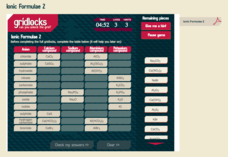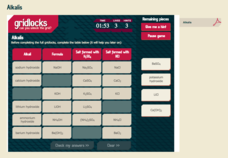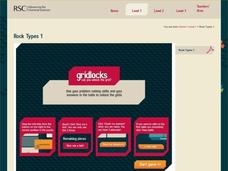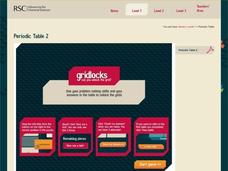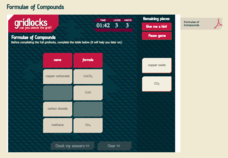Royal Society of Chemistry
Oxide Types
Amphoteric compounds act as both an acid and a base. Scholars apply their knowledge of the four oxide types while completing four puzzles. They match a sample of each type of oxide with the corresponding reaction.
Royal Society of Chemistry
Ionic Formulae 2
Scientists call ions with a negative charge anions. Scholars work through one matching puzzle and four logic puzzles reviewing the chemical formulas for anion ions. Each level increases in difficulty and solidifies the concept in pupils'...
Royal Society of Chemistry
Hydroxide Precipitates
When two liquids combine and a solid forms, the new substance is called a precipitate. Scholars test their knowledge of hydroxide precipitates and their properties. A series of four increasingly difficult puzzles challenge their logic...
Royal Society of Chemistry
Forensic Tests
Flame tests determine if there is a specific metal in a chemical compound. Young forensic scientists review their understanding of flame tests and hydroxide precipitates by solving puzzles. The timed review encourages mastery.
Royal Society of Chemistry
Esters from Alcohols and Acids
Fats and oils often contain esters, which sometimes find their way into perfumes due to their pleasant smells. Scholars match the name of esters made from four different types of alcohol and four different types of carboxylic acids....
Royal Society of Chemistry
Crude Oil
The United States consumes more oil than any other country, and its residents use 50 percent of that for transportation. Scholars match eight fractions of crude oil to their applications. Then, they fill in three logic puzzles reviewing...
Royal Society of Chemistry
Alkalis
Because they are reactive with air and water, scientists store alkalis in oil. Scholars complete a series of four puzzles reviewing information about alkalis. They match the alkali to its formula, the salt formed with H2SO4, and the salt...
Royal Society of Chemistry
Alcohols (14-16)
Ethanol, a grain alcohol, reduces emissions and conserves petroleum when mixed into gasoline. Four puzzles challenge pupils to match alcohols to their structural formulas, types of alcohol, and full oxidation products. Each puzzle...
Royal Society of Chemistry
Acids
She threw sodium chloride at me—that's a salt! Scholars match acids to their formulas as well as their salt compounds. Completing a series of three gridlock puzzles reinforces each of the matches in a logical manner.
Royal Society of Chemistry
States of Matter 2
While scientists have identified seven states of matter, these puzzles cover the most common three. Scholars match the properties, particle motion, and particle picture to each type of matter. Three Sudoku-style puzzles review the data...
Royal Society of Chemistry
Rock Types 2
All rocks include two or more minerals but greatly vary in appearance. The online interactive encourages scholars to match the rock types to the facts they know about each. They then complete three grid puzzles reviewing the same...
Royal Society of Chemistry
Elements 2
Did you hear about the chemist reading the book about helium? He couldn't put it down. Scholars match 12 chemical elements, including helium, to their symbols. Then they complete three Sudoku-style puzzles using these names and symbols...
Royal Society of Chemistry
States of Matter 1
Do solids, liquids, and gases even matter? Scholars match the state of matter to its particle picture, size and shape description, and description of the arrangement of the particles. Once they complete that activity, they complete a...
Royal Society of Chemistry
Rock Types 1
If pupils think the three types of rock are classic, punk, and hard, these puzzles offer gentle correction. Scholars match the type of rock to how it formed and an example in four grid puzzles. Each requires problem-solving and...
Royal Society of Chemistry
Periodic Table 2
While the periodic table looks complex, it is really arranged by only two variables, atomic number and electron configuration. The set of four puzzles focuses on groups 3, 4, 5, and 6 or 13, 14, 15, and 16, depending on your periodic...
Royal Society of Chemistry
Periodic Table 1
Richard Feynman predicted the periodic table might go up to number 137—but never to 138. Scholars practice naming which elements belong in groups 1, 2, 7, and 0 on the periodic table in puzzles. They work through four puzzles reinforcing...
Royal Society of Chemistry
Naming Binary Compounds
Penguinone is an organic compound named because it resembles a penguin. Scholars match the name of binary compounds to the elements in each compound. Then, they solve three sets of puzzles reviewing the same content.
Royal Society of Chemistry
Formulae of Compounds
Many people confuse the chemical formulas for copper carbonate and copper oxide. A set of challenging puzzles review commonly confused compound names and their symbols. Through a series of four puzzles, pupils match the names and...
Royal Society of Chemistry
Everyday Chemicals (Ages 11-14)
Caustic soda helps break up clogs in drains in many homes. Scholars match 10 chemical names to their everyday names; for example, caustic soda is sodium hydroxide. Then, they complete three different grid puzzles practicing this skill.
Royal Society of Chemistry
Elements 3
Many pupils mix up the chemical symbols for calcium, carbon, and copper. These entertaining puzzles help scholars remember the names and symbols. First, they match the name and symbol of 12 elements. Then, through a series of three...
Royal Society of Chemistry
Hazard Symbols
Starting in 2015, all chemicals must have a pictogram of the associated chemical hazards. A brain-building activity reviews four of the basic symbols found in a typical science laboratory. Through a fun puzzle, scholars apply their...
Royal Society of Chemistry
Elements 4
Don't miss the silver lining when you are looking for gold. A brain-bending interactive allows scholars to sharpen their puzzle skills while reviewing chemical elements, including silver and gold. First, pupils match 12 chemical elements...
National Library of Medicine
Your Environment, Your Health: The Great Debate—Bottled Water vs. Tap Water in Our School
Should bottled water be sold in schools, or should they only provide tap water? The summative unit in the six-part series encourages scholars debating this topic. The lessons teach how to build an argument, how to gain background...
Rensselaer Polytechnic Institute
Molecules to the Max!—Teacher's Discovery Guide
Molecules to the Max! refers to a movie released in 2009 about the world of atoms and molecules. A helpful discovery guide provides five posters on science topics typically covered at the middle school level. It also explains the...



